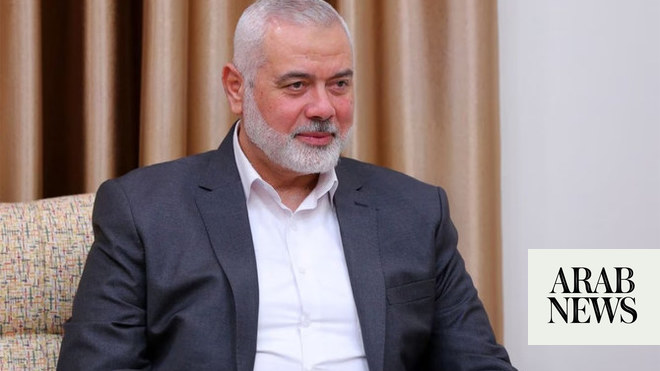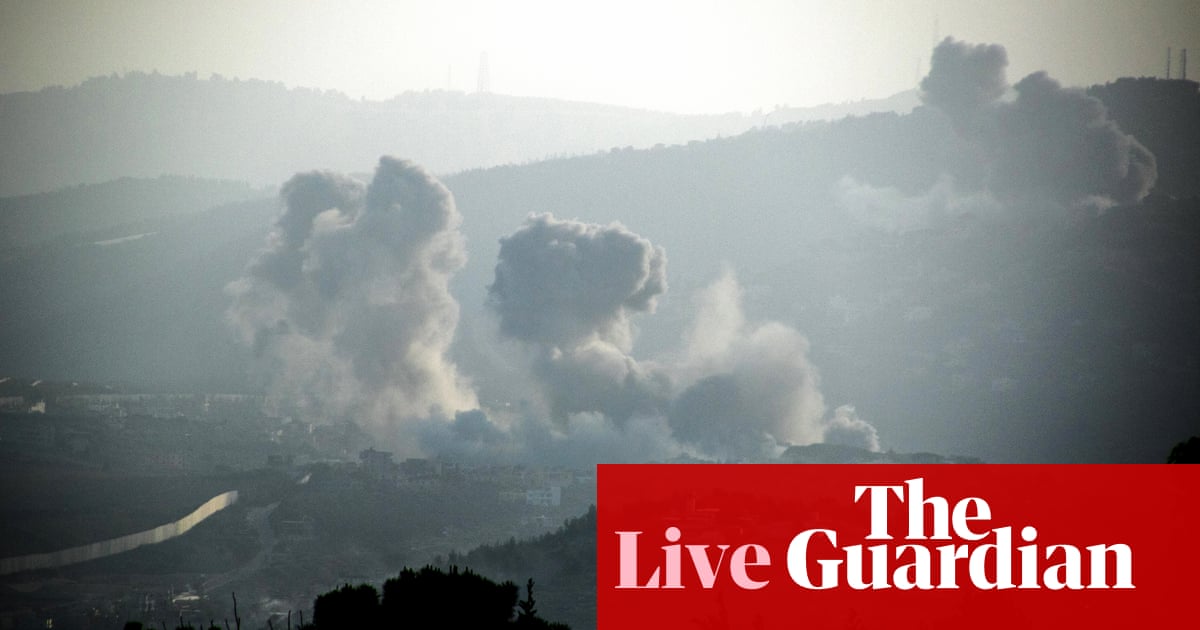
Hamas leader Ismail Haniyeh killed in Iran, group says
Hamas leader Ismail Haniyeh has been killed in Tehran, the Palestinian militant group Hamas has said.
In a statement, the Islamist faction mourned the death of Haniyeh, who it said was killed in “a treacherous Zionist raid on his residence in Tehran”.
Earlier, Iran’s Revolutionary Guards said he had been targeted in his residence along with an Iranian bodyguard. It said he had been in Iran to attend the inauguration of President Masoud Pezeshkian. It said it was investigating the circumstances of the “incident”.
Israel has yet to comment on his killing.
Haniyeh was the exiled political chief of the militant group and had spent much of his time in recent years in Qatar and Turkey. Considered a pragmatist, he had acted as a negotiator in the ceasefire talks during the Israel-Gaza war, liaised with Hamas’s main ally, Iran, and met with the Turkish president.
Haniyeh was also said to maintain good relations with the heads of the various Palestinian factions, including rivals to Hamas.
Haniyeh was elected head of the Hamas political bureau in 2017 to succeed Khaled Meshaal, but was already a well-known figure having become Palestinian prime minister in 2006 following an upset victory by Hamas in that year’s parliamentary election.
Here’s the Guardian’s full report on the assassination of Ismail Haniyeh from our correspondent Emma Graham-Harrison:
Ismail Haniyeh, the political leader of Hamas, has been targeted and killed in Tehran, the group said in a statement early on Wednesday morning.
The Hamas statement said the group mourned Haniyeh “who died as a result of a treacherous Zionist raid on his residence in Tehran, after participating in the inauguration ceremony of the new Iranian president”.
Iran’s Revolutionary Guard confirmed the assassination, which was reported on Iranian State TV early on Wednesday morning, with analysts also claiming Israel killed Haniyeh, the AP said.
The Israeli military declined to comment. Israel has a history of covert assassinations inside Iran, mostly hitting scientists working on the country’s nuclear programme.
The death of Haniyeh is damaging to Hamas, but he was not involved in the military operations on the ground in Gaza, and the group has survived past assassinations of its leadership.
In 2004, Israel killed both Hamas leader Ahmed Yassin and co-founder Abdel Aziz al-Rantisi in attacks in Gaza.
Haniyeh’s death came just hours after Israel claimed it killed Hezbollah’s top military commander, Fuad Shukur, in an airstrike on a south Beirut suburb launched in retaliation for a rocket attack that killed 12 children at the weekend.
The death of Haniyeh is damaging to Hamas, but he was not involved in the military operations on the ground in Gaza, and the group has survived past assassinations of its leadership.
In 2004, Israel killed both Hamas leader Ahmed Yassin and co-founder Abdel Aziz al-Rantisi in attacks in Gaza.
Haniyeh’s death came just hours after Israel claimed it killed Hezbollah’s top military commander, Fuad Shukur, in an airstrike on a south Beirut suburb launched in retaliation for a rocket attack that killed 12 children at the weekend.
The US had been leading a global diplomatic effort to prevent tensions between Israel and Hezbollah, which is backed by Tehran, from escalating into full blown regional conflict.
The two assassinations now raise the stakes not just for Hamas and Hezbollah, but Iran, which backs both groups.
Haniyeh"s assassination a grave escalation, Hamas official says
The assassination of Hamas leader Ismail Haniyeh in Iran is a grave escalation that will not achieve its goals, Hamas official Sami Abu Zuhri has told Reuters.
A few more photos of Ismail Haniyeh from over the years:
Ismail Haniyeh assassination in Iran is a “cowardly act that will not go unpunished”, Hamas-run Al-Aqsa TV has cited senior Hamas official Moussa Abu Marzouk as saying.
Hamas’ leadership arrangements can be opaque to outsiders. Ismail Haniyeh was officially the chair of the group’s political political bureau and lived in exile, while Yahya Sinwar is the leader of Hamas in Gaza and was reportedly the mastermind of the 7 October attack on Israel. Khaled Mashal is also a prominent Hamas political leader who lives in exile.
My colleague, Jason Burke, wrote an explainer on Hamas’ strength and the possibility of a Gaza ceasefire at the end of last year and in it he delved into Hamas’ leadership structure. Here’s an excerpt:
In theory, Hamas is run by a leadership council or “shura’” drawn from regional councils elected by Hamas members in Gaza, the West Bank and by prisoners in Israeli jails. In reality, the organisation is riven by factional disputes and personality clashes.
One split divides the military from the political wings. Another pits the leaders in Gaza, who have lived for decades in the crosshairs of Israel’s security agencies or spent years in Israeli jails, against senior figures overseas in Qatar, Turkey, Lebanon or elsewhere who live in relative comfort and security.
This is aggravated by personality clashes. Yahya Sinwar, the leader of Hamas in Gaza, is said to be barely on speaking terms with Khaled Mashal, who is the best-known of the organisation’s political leaders and based in Qatar.
It is unclear if Sinwar briefed the political leadership in Qatar and Lebanon on the planned 7 October attacks but this is thought unlikely by experts – adding to the resentment.
The relatively pragmatic Ismail Haniyeh, the chair of Hamas’s political bureau, tries to mediate among the factions, though with little success, experts say.
Haniyeh also has his own job to do. “Haniyeh is leading the political battle for Hamas with Arab governments,” said Adeeb Ziadeh, a specialist in Palestinian affairs at Qatar University. “He is the political and diplomatic front of Hamas.”
The internal disputes complicate this task. In recent weeks, Haniyeh has moved between Turkey and Qatar’s capital, Doha, escaping the travel restrictions of the blockaded Gaza Strip and enabling him to act as a negotiator in the earlier ceasefire deal or talk to Hamas’s main ally, Iran.
But the final yes or no comes from Sinwar. When during recent talks Sinwar decided to cut off communications, negotiations stalled. “This pretty effectively underlined who is calling the shots,” said one European diplomatic source briefed the negotiations.
Here is the full statement from Iran’s Revolutionary Guards:
With condolences to the heroic nation of Palestine and the Islamic nation and the fighters of the resistance front and the noble nation of Iran, this morning [Wednesday] the residence of Mr. Dr. Ismail Haniyeh, the head of the political office of the Islamic resistance of Hamas, was hit in Tehran, and following this incident, he and one of his bodyguards was martyred.
The cause and dimensions of this incident are being investigated and the results will be announced later.
Israel has yet to make any comment on Ismail Haniyeh’s killing but in its statement Hamas accused it of responsibility. Associated Press reports that analysts on Iranian state television have also begun blaming Israel for the attack. The agency writes:
Israel itself did not immediately comment but it often doesn’t when it comes to assassinations carried out by their Mossad intelligence agency.
Israel is suspected of running a years-long assassination campaign targeting Iranian nuclear scientists and others associated with its atomic program.
In 2020, a top Iranian military nuclear scientist, Mohsen Fakhrizadeh, was killed by a remote-controlled machine gun while traveling in a car outside Tehran.
Here is some of the last images of Ismail Haniyeh – he was photographed in Tehran on Tuesday meeting Iran’s Supreme Leader Ali Khamenei (R) and secretary general of the Palestinian Islamic Jihad Movement Ziyad al-Nakhalah (L).
Hamas leader Ismail Haniyeh killed in Iran, group says
Hamas leader Ismail Haniyeh has been killed in Tehran, the Palestinian militant group Hamas has said.
In a statement, the Islamist faction mourned the death of Haniyeh, who it said was killed in “a treacherous Zionist raid on his residence in Tehran”.
Earlier, Iran’s Revolutionary Guards said he had been targeted in his residence along with an Iranian bodyguard. It said he had been in Iran to attend the inauguration of President Masoud Pezeshkian. It said it was investigating the circumstances of the “incident”.
Israel has yet to comment on his killing.
Haniyeh was the exiled political chief of the militant group and had spent much of his time in recent years in Qatar and Turkey. Considered a pragmatist, he had acted as a negotiator in the ceasefire talks during the Israel-Gaza war, liaised with Hamas’s main ally, Iran, and met with the Turkish president.
Haniyeh was also said to maintain good relations with the heads of the various Palestinian factions, including rivals to Hamas.
Haniyeh was elected head of the Hamas political bureau in 2017 to succeed Khaled Meshaal, but was already a well-known figure having become Palestinian prime minister in 2006 following an upset victory by Hamas in that year’s parliamentary election.
Opening summary
Welcome to our live coverage of events in the Middle East.
Hamas leader Ismail Haniyeh has been killed in Iran, the militant group has confirmed in a statement.
Earlier, Iran’s Revolutionary Guards said he had been targeted in his residence along with an Iranian bodyguard. It said he had been in Iran to attend the inauguration of President Masoud Pezeshkian. It said it was investigating the circumstances of the “incident”.
Haniyeh was the exiled political chief of the militant group and had spent much of his time in recent years in Qatar.
Here is a summary of the latest developments.
Israel says it has killed Hezbollah’s top military commander, Fuad Shukur, in an airstrike on a south Beirut suburb launched in retaliation for a rocket attack that killed 12 children at the weekend. Shukur, also known as Hajj Mohsin, served as right hand man to Hezbollah leader Hassan Nasrallah, Israel’s military spokesperson R Adm Daniel Hagari said in a briefing on Tuesday night.
US defence secretary Lloyd Austin does not believe that a fight between Israel and Hezbollah is inevitable, and said Washington would like to see things resolved in a diplomatic fashion, Reuters reports. “While we’ve seen a lot of activity on Israel’s northern border, we remain concerned about the potential of this escalating into a full-blown fight. And I don’t believe that a fight is inevitable,” Austin said. “We’d like to see things resolved in a diplomatic fashion.” Austin made the comments on Tuesday at a joint press conference in Manila.
Israel’s military has charged a reservist with aggravated abuse of Palestinian prisoners, a spokesperson said on Tuesday, as nine other soldiers appeared in military court for an initial hearing over allegations they had sexually abused a detainee from Gaza. The other soldiers detained on Monday are accused of raping and attacking a Palestinian prisoner at the Sde Teiman detention centre so violently that he was taken to hospital in critical condition, Israeli media reported.
Gaza official says 300 people were killed in Israel’s assault on Khan Younis. Thousands of Palestinians returned home on Tuesday after the assault came to an end. Gaza’s civil defence agency said Tuesday that the Israeli operation in and around the city killed about 300 people since it began last week.
Two air defence bases in southern Syria have been struck by Israeli missiles, a war monitor has said. The Britain-based Syrian Observatory for Human Rights reported no casualties in the overnight strikes in Daraa province, which abuts the armistice line separating Syrian and Israeli forces on the Golan.
Italian prime minister Giorgia Meloni on Tuesday called on Israel not to fall into the “trap” of retaliation, saying she was “very, very worried” by the situation in Lebanon and by the risk of a regional escalation. Speaking during an official visit to China, Meloni said the international community should continue sending messages of moderation, and that China could help in these efforts, having “solid ties” with Iran and Saudi Arabia.











